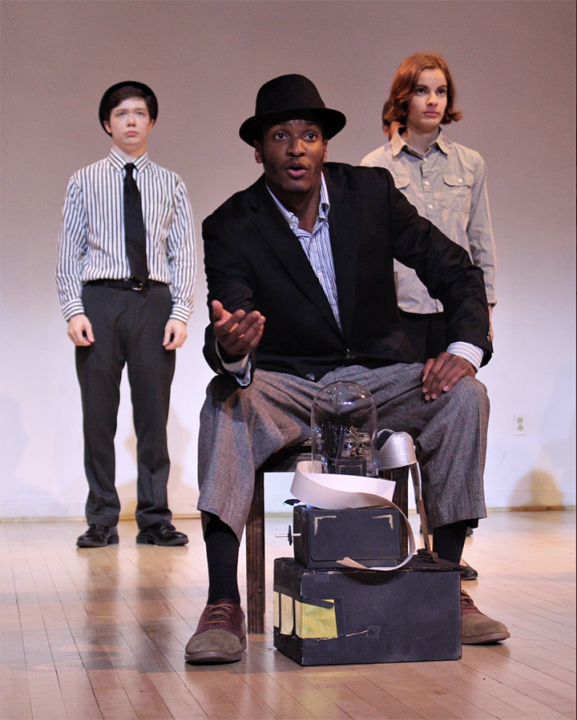Excited chatter echoed throughout the Fine Arts Recital Hall as audience members waited patiently for the performance to begin. Finally, the lights dimmed and the audience held its breath, anticipation visible on everyone’s faces. “You Gotta Live!” opened for the first time on May 2, a musical written entirely by UMBC’s very own Sam Saper, who is a media and communication studies major. He spent the last three years writing the script, instrumentals and song lyrics, and his dedication paid off dearly.
“You Gotta Live!” was a story within a story about the influential 20th-century writer Bob Brown, played by Wesley Collins. The audience followed Bob as he pursued his desire to satisfy both his sense of adventure and internal need to make real change happen in the corrupt and poverty-stricken society in the United States that he had come to know.
Not only did the play showcase his story, but it also featured many other radical writers of the time, such as Mina Loy (Hannah Bashar), Man Ray (Connor Axtell) and Gertrude Stein (Erin Everton), who moved American literature and culture in an entirely new direction. The actors, although constricted to the historical background of their characters, and who seemed to lack confidence in the first half of the show, fit their roles perfectly. Connor Axtell awkwardly but humorously delivered puns throughout the entire performance, capturing the true essence of the writer. Shayna Greenblatt easily portrayed the loving yet independent and strong-willed woman who became Brown’s second wife, Rose.
However, one downside to having such a large cast was the creation of a lengthy and convoluted plot structure. The musical, totaling about three and a half hours, attempted to include so many stories of writers that it became difficult to truly become acquainted with the characters and to focus the plot around one particular emotional conflict.
It may have been beneficial to begin the plot from the scene where Bob and Rose went to Brazil. That way, there would be more room to build to a climax and central tension to then extend the end of the musical, allowing for an explanation of the killing of the narrator and a satisfying resolution.
Nonetheless, the show remained engaging, particularly due to some unique aspects that remain rare in the theatre community. For example, the incorporation of the narrator, labeled “History” and played by Saper, was a great addition to the musical. History dictated the show, and at the end of Act I, he sang his own song directly to the audience, filling the room with laughter and also a premonition for the danger to come in Act 2. This was one of the best moments in the musical, not only because of Saper’s dramatic ability, but also due with the song’s drastic contrast with the previous scene where the characters sang of hope in a new world.
This does not even begin to mention the surprisingly beautiful voices of the rest of the actors. A few of the songs, like “L-Shana Tova” and “All The World,” both sung by Bob and Rose, completely captivated the audience. The thundering applause and cheering that followed their performances spoke for itself. Some of the more upbeat songs, most notably “Thick Alternating Square Dance (Fresh Paint),” had the audience dancing along with the actors.
As a musical-writing debut, “You Gotta Live!” is certainly an impressive testament to Saper’s dedication and energy, and we cannot wait to see what he comes up with next.


